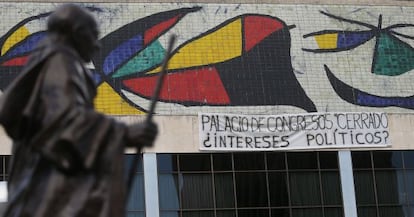Ministry admits it cannot maintain landmark Madrid conference center
Sat across from the Bernabéu stadium, the Palacio de Congresos has been empty since 2012

An air of abandonment now hangs over Madrid’s Palacio de Congresos, just across the main Paseo de la Castellana thoroughfare from Real Madrid’s Bernabéu soccer stadium. The conference center and concert venue, built in 1970 and decorated with a mural designed by Joan Miró, hosted Turespaña, Spain’s tourism office, until December 2012, when it was closed for what was supposedly a three-month refurbishment.
Now the Industry, Tourism and Trade Ministry says it does not have the funds to complete the work in line with municipal health and safety guidelines. “We’re talking about work that requires a significant investment, which at the moment we are not able to meet,” reads a written reply by the government to a question by the centrist Union, Progess and Democracy (UPyD) party.
While the building was closed, the ministry applied for permission to carry out “minimal repairs” and “occasional work” to improve safety. But construction legislation introduced in 2006 requires meeting criteria unimaginable 44 years ago, for example improved emergency access and exits, climatization, plumbing, lifts, wiring, and environmental protection.
The UGT labor union estimates the cost of the repairs at around €40 million
“It’s not easy to just meet these new requirements,” says a ministry spokesman. The UGT labor union estimates the cost of the work at €40 million, while the ministry refuses to provide a figure.
In October 2013, sources in the ministry’s tourism section told EL PAÍS that it was considering selling off the building to a developer who wanted to turn it into an upscale shopping mall.
The center is costing €2 million a year to maintain while it was closed. In the wake of the deaths at Madrid Arena, caused by overcrowding at a Halloween party in November 2012, Mayor Ana Botella closed the building, which was due to host the drawing of Spain’s Christmas “Gordo” Lottery.
UPyD says last year Madrid reached the number two spot in the global ranking of conference destinations
UPyD, a small, centrist opposition party, has taken up the matter of the building’s future. “The reply to our question in Congress is typical of this government, which never answers anything clearly, and gives no date as to when this issue will be sorted out,” says Luis de Velasco, UPyD’s spokesman. “If the construction legislation dates to 2006, what were they thinking when they applied for permission in 2012 to refurbish it? They must have known what would be required,” he adds. An inspection in 2010 detected several key safety and construction faults, prompting City Hall to ban large-scale events at the venue.
De Velasco points out that last year, Madrid reached the number two spot in the global ranking of conference destinations, after Paris. Five years ago it was ranked 22nd.
UPyD has also asked the government why it sacked José María Bethencourt, the director of the Palacio de Congresos, in March, when the building was supposed to have opened more than a year before. “This represents an adaptation of human resources to the needs of the organization,” the ministry replied.
Meanwhile, the Joan Miró Foundation says it has not been informed of events at the building, or City Hall’s plans for the more than 10,000 tiles that decorate the façade of the building should it be sold. Miró, who also designed a mural for Madrid’s Barajas Airport, said in writing that any modification to it would require consultation with him or the administrators of his estate.
Cafeteria staff unpaid for 20 months
The 37 people employed by the Palacio de Congresos cafeteria, which was run by the Husa catering group, have not been paid since the building was closed in late 2012. The company and Turespaña both say the other is responsible. The Madrid Supreme Court ruled in September that Husa was accountable to pay the workers.
“It makes no sense,” says Manuel Zapata, who is also a member of the CCOO labor union. “I have worked here for 25 years, and there are others who have been here for 40 years. Husa only took over four years ago. It is Turespaña’s responsibility.”
Husa, which is owned by Joan Gaspart, the vice president of the CEOE employers’ confederation, has been in bankruptcy proceedings since February, and owes around €200 million. It has assets valued at €150 million. In April, it began proceedings to lay off two thirds of its work force.
The 37 are to take their case to the Supreme Court again, to force Husa to accept responsibility for paying them, but all say they are skeptical that this issue will be sorted out any time soon.
Twenty-eight other Palacio de Congresos employees, among them cleaners, have been transferred to other City Hall-run buildings, including government departments and the Soto del Real jail.
Tu suscripción se está usando en otro dispositivo
¿Quieres añadir otro usuario a tu suscripción?
Si continúas leyendo en este dispositivo, no se podrá leer en el otro.
FlechaTu suscripción se está usando en otro dispositivo y solo puedes acceder a EL PAÍS desde un dispositivo a la vez.
Si quieres compartir tu cuenta, cambia tu suscripción a la modalidad Premium, así podrás añadir otro usuario. Cada uno accederá con su propia cuenta de email, lo que os permitirá personalizar vuestra experiencia en EL PAÍS.
¿Tienes una suscripción de empresa? Accede aquí para contratar más cuentas.
En el caso de no saber quién está usando tu cuenta, te recomendamos cambiar tu contraseña aquí.
Si decides continuar compartiendo tu cuenta, este mensaje se mostrará en tu dispositivo y en el de la otra persona que está usando tu cuenta de forma indefinida, afectando a tu experiencia de lectura. Puedes consultar aquí los términos y condiciones de la suscripción digital.









































